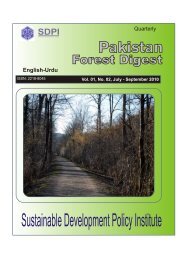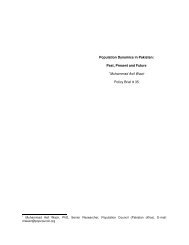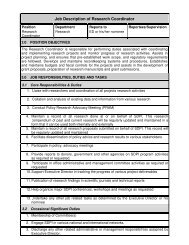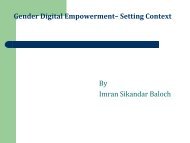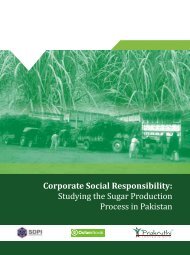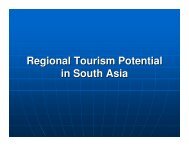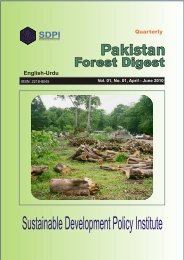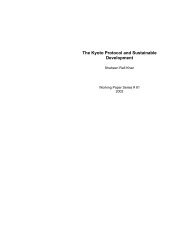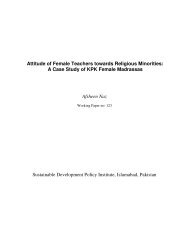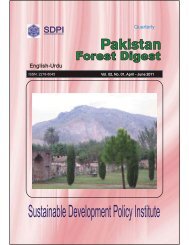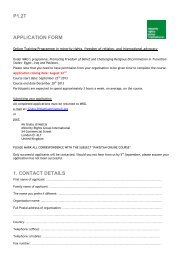Annual Report 2009-10 - Sustainable Development Policy Institute
Annual Report 2009-10 - Sustainable Development Policy Institute
Annual Report 2009-10 - Sustainable Development Policy Institute
- No tags were found...
Create successful ePaper yourself
Turn your PDF publications into a flip-book with our unique Google optimized e-Paper software.
<strong>Annual</strong> <strong>Report</strong><strong>2009</strong> - 20<strong>10</strong>EducationHuman <strong>Development</strong>: Enlightenment through EruditionAt SDPI, we believe in the right to education for every citizen. The focus of our research is notonly education but quality education. We have been trying to understand the reasons of dropoutsin primary schools. We are analyzing how education can promote religious discriminationbut also proposing alternative curriculum & textbooks to respect religious diversity. Currently,much of our work on education and that of respecting religious diversity is cross-cutting.Lack of Primary School Education (LAPSE)SDPI provided technical support and backstopping to the Human <strong>Development</strong> Foundation(HDF) for conducting a national level survey that provided an overview of the major underlyingcauses of high school dropouts. The surveys were conducted in public, private & HDF fundedschools in Islamabad, Rahim Yar Khan, Lahore, Tando Muhammad Khan, Karachi, Mardan,Zhobe & Muzaffarabad.This study provided an overview of the major underlying causes of high school dropouts. It differsfrom other studies, in its nature and extent as it has not only addressed causes of schooldropouts across public, private and NGO funded schools but also the factors behind out ofschool or never enrolled children. Specific attention was given to four areas of concern, factorsrelated to the child him/herself, the family, the school and society as a whole. Each of these factorswas discussed in the light of quantitative as well as qualitative aspects.The methodology adopted for this study was based on Desk Reviews, Focus Group Discussionsand Key Informant Interviews and Case studies. The locus of the study was not confined to largercities or urban regions rather baseline information was gathered from rural households.More information about this study can be obtained from Mr. Gulbaz Ali. gulbaz@sdpi.orgRespecting Religious DiversityThe Relationship between Education and Religious Discrimination in Pakistan-Analysisof Curriculum and Pedagogy in Pakistani SchoolsThe curriculum which is being taught in Pakistani schools and Madrasas tends to promote religiousdiscrimination. The captioned project aims to gain insights into the curriculum taught inboth public sector schools and Madrasas and study the pedagogy, so it can provide recommendationsto rationalize the curriculum and refine the pedagogical methodology to eliminate discriminationagainst religious minorities. This study includes within its scope an in-depth examinationof official textbooks used by the public and madrasa schools at the primary and secondarylevels.The study report will offer the Pakistani education policy makers a concrete action plan to removethe negative portrayal of religious minority groups in public schools and the Madrasa EducationalSystem. It will also provide recommendations for the removal of objectionable content,which can cause friction between majority and minority groups in Pakistan. Key objectives of thestudy are:• To find out to what extent religious minorities are represented in these school curricula;• The degree to which biases against religious minorities result from how these minoritiesare portrayed in the educational system (through both curriculum and pedagogy);• The degree to which biases that have resulted from the educational systems have led todiscriminatory or extremist actions against religious minorities in Pakistan¬whether at thelevel of youth, the community, societal leadership, or extremist groups.32S u s t a I n a b l e D e v e l o p m e n t P o l I c y I n s t I t u t e



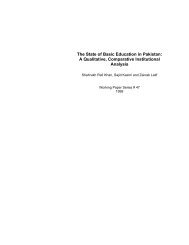
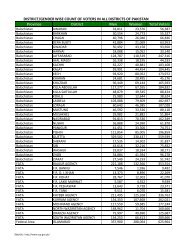
![(October - December, 2010) [13th SDC Special Bulletin]](https://img.yumpu.com/50118608/1/184x260/october-december-2010-13th-sdc-special-bulletin.jpg?quality=85)
